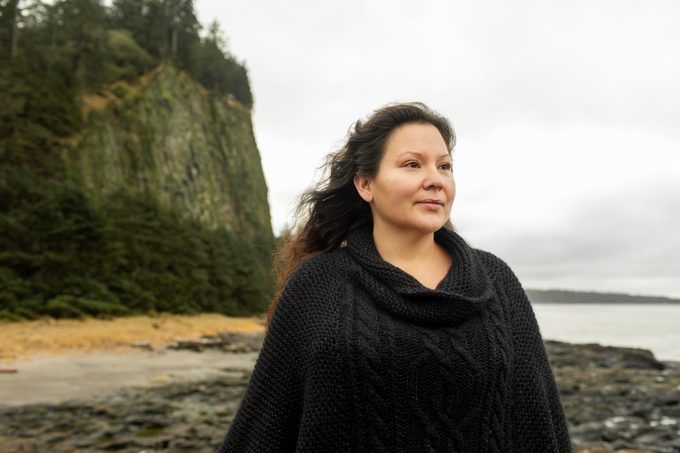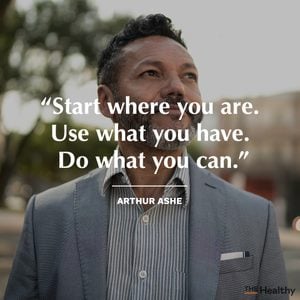9 Ways to Build Resilience, According to Mental Health Experts
Updated: Jun. 28, 2021
It is possible to start building resilience at any age, experts say, but you need support from friends and family. Here's how to do it.
Our editors and experts handpick every product we feature. We may earn a commission from your purchases.
Can you build resilience?
Resilience is part of human nature, but it often seems easier for some people.
Why do so many of us struggle to cope with everyday adversity, while others rebound almost immediately, even in a crisis like the Covid-19 pandemic?
The causes and effects of individual resilience are a lot more complicated—and a lot less dependent on individual personality traits—than many people realize.
Here is a closer look at what resilience means, what research can tell us about its development, and what you can do to start building resilience in yourself.
(Here’s how to overcome an existential crisis.)
What does resilient mean?
Resilience is a broad term, and it isn’t always defined the same way, even among psychologists.
It is not about the avoidance of misfortune, which still affects even the most resilient people, but rather how we respond to it.
In general, resilience means “doing well in the face of risk or adversity,” says Suniya Luthar, professor emerita at Columbia University’s Teachers College and cofounder and chief research officer of Authentic Connections, a company that helps build resilience and well-being in schools.
But what constitutes adversity, and how do we know if we’re handling it well? “The definition of doing well definitely varies according to the severity of the stress of the experience,” she explains.
Where does resilience come from?
Resilience is sometimes framed as a set of skills or traits that help us cope with adversity, but while resilience does depend partly on individual abilities and personalities, research increasingly suggests it’s built mainly by the world around us—namely our relationships with other people.
“I think the most common misunderstanding about human resilience is thinking of resilience as an individual trait,” says Ann Masten, a professor of child development at the University of Minnesota who studies risk, competence, and resilience.
Instead, our support system is integral to our resilience.
“A person’s resilience depends on many interconnected systems inside and outside of our minds and bodies, including our relationships with other people and supports from the world around us, not just individual strengths or capabilities,” she says.
Personal qualities like self-confidence, self-control, and problem-solving skills do play big roles in resilience. It’s just that, according to research, social support plays an even bigger role.
“When people do well in the face of adversity, we know now from science that actually the single most important thing is being supported in your closest relationships,” Luthar says. “It’s true for children, and it’s equally true for their parents.”
It’s never too late to build resilience
That doesn’t mean we can’t build resilience in ourselves, though. It just means we can’t do it alone.
“The way I talk about it is our ability to navigate and find the resources we need, the supports we need, as well as negotiate for resources or supports to be given to us in ways that we experience as meaningful,” says Michael Ungar, a professor in the School of Social Work at Dalhousie University in Halifax, Nova Scotia, in Canada and author of Change Your World: The Science of Resilience and the True Path to Success.
“So, I am resilient to the extent that my environment or my world around me allows me or creates opportunities for me to be successful,” he says.
While childhood is the prime time for building resilience, it can be done in adulthood, too.
“Earlier is better, but it’s never too late,” says Ungar.

How to build resilience
According to our panel of mental health experts, as long as you have the support of family and friends, you can start building resilience today.
Here are some of their expert tips to help you along the way.
Seek (and accept) support
“If the question is how can we best help people be resilient in the face of adversity or trauma, the first answer is always make sure they have a healthy, dependable support network and especially positive relationships in their immediate social circles, like family and friends,” Luthar says.
For young children, that mostly means good relationships with primary caregivers. They need a basic level of support regardless of whether they ask for it.
As we get older, we often have to actively seek support from our social networks—or at least resist the impulse to decline it.
Our best resources for resilience tend to be our close friends and relatives, who play underrated roles in bolstering mental health.
“Even in adulthood, if you have a supportive spouse, this can help move the negative trajectory of adjustment to a more positive one,” Luthar says. “In other words, you can still move away from what would have normally happened, in terms of risk for depression, anxiety, and so on.”
Nurture relationships
The key to building resilience is setting up—and maintaining—a support network before you need it, Ungar says.
Invest in your relationships with friends and family members whom you trust, especially those who are empathetic and compassionate. When adversity strikes, a supportive friend with good listening skills can make a surprisingly big difference.
Of course, friendships are not just resources to hoard for times of trouble; they’re active relationships that need attention.
While a good friendship shouldn’t be transactional, it does require investment from everyone involved. If you want your friends and family to support your resilience, remember to support theirs too.
“Always, always first focus on getting more support and building a support network,” Luthar says. “And obviously this means you have to give to get, because these are mutually supportive networks.”
If you are struggling to muster resilience, reach out to family, friends from high school, or any trustworthy adult, she adds. But don’t get in touch only when you need help.
“Reach out to them and then do the work of staying in close touch,” she says.
Build new relationships
We may learn resilience most easily in early childhood, but we also tend to have wider social networks as we get older, Luthar points out, giving us more potential sources of support.
“For little kids, obviously the quality of relationship with caregivers is paramount, and that continues for older kids as well. But older kids can also have the advantage of possibly positive relationships with peers and with teachers at school and so on,” she says.
As we age, our social circles change, often broadening.
“If you think about development over time, for most of us, our social circles widen a bit from infancy through adulthood,” Luthar says. “So there are more and more opportunities to have positive, supportive relationships to possibly offset the presence of difficult ones early in life.”
If your existing relationships don’t provide enough support, take steps to make new ones.
This is not a quick fix if you need resilience right now, but it could be a valuable investment in future resilience.
If, like many people, you aren’t sure how to make new friends as an adult, try placing yourself in environments where that’s easier—a social group centered on a shared interest, for example, like a book club, yoga class, or volunteer project.
Find a sense of purpose
Having a sense of meaning or purpose is a key component of happiness in general, and it can be especially valuable as people navigate big life changes like retirement, Ungar says.
This sense of purpose might come from our roles as students or workers earlier in life, but it can also come from hobbies or volunteer projects in retirement, like growing a backyard vegetable garden or cleaning up litter in a neighborhood park.
Resilience depends largely on having our basic needs met, including social support, but it also depends on feeling like other people need us.
“When you’re housed and fed and somebody needs you, you just cope with stress that much better,” Ungar says. “We have meaning in our lives, and we have a bigger sense of mission and purpose, and that all comes partly from the world around us needing us.”
Keep daily routines
Spontaneity can be fun, but there is also comfort—and possibly confidence—in having some predictability to your day.
This is true for almost anyone, Ungar says, whether it’s a new retiree who still sets an alarm every morning or a family that keeps regular meal and bedtimes while living in a refugee camp.
“Children rely a lot more on the adults in their lives to create the environments so they can actually be successful,” Ungar says, noting that many children do cope well in refugee camps largely because their parents impose routine.
Adults must create those environments for themselves, he adds, although we still need help.
“With adults, it’s a little more difficult. You have to decide to turn the TV off. You have to find the other activity, push yourself to go for a walk,” Ungar says.
After a trauma or setback, it can be hard to motivate ourselves to do the things that’ll help us cope. That’s why our ability to bounce back from adversity is so dependent on the people and world around us.
“It’s a lot easier to do those things if you have a sidewalk in front of your house. If you have a gym to go to and a friend who will get a gym membership with you,” says Ungar. “So while we often think about resilience as just this internal motivation, what the research actually shows us, over and over again, is it’s also about these things around us that make it possible to experience that motivation.”
Don’t try to banish misfortune completely
Resilience usually refers to how we handle serious adversity, Masten says, but our reactions to big problems may be informed partly by the many smaller setbacks we face in daily life.
That kind of experience is especially important for kids, she notes.
“Everyday stress probably helps us to learn how to handle bigger challenges and gradually optimize our adaptive systems, just as our immune systems ‘learn’ to handle challenges,” she says.
In fact, small doses of manageable stress may be important for developing resilience.
“Parents, teachers, mentors, and coaches often foster resilience in part by providing experiences that are challenging in just the right ways to build resilience capacity without overwhelming or discouraging children,” says Masten. “Children need some exposure to adversity in order to gain skills and confidence for handling the inevitable challenges of life.”
(Here are some resilience quotes to help coach you through adversity.)
Don’t sabotage your health
Self-care may not make you more resilient on its own, but you are probably undermining your other efforts to build resilience if you neglect it.
Taking good care of your body can boost your physical resilience, which is a good thing even if you don’t notice an effect on your emotional resilience.
Anyone hoping to improve resilience should make sure they get, among other things, regular exercise, healthy food, and enough sleep, Masten says.
Think about how you think
No amount of mindfulness, gratitude, or optimism can take the place of social support, a fact that’s often overshadowed in discussions of resilience that focus on individual thoughts and actions.
That said, many people with social support and high resilience do exhibit traits like optimism and gratitude, which may be easier to practice if your more basic needs are met.
In that case, mindfulness meditation and gratitude exercises might be helpful tools in your quest for resilience.
By developing better emotional awareness and metacognition—thinking about your own thoughts—you might gain more control over emotional impulses or feel calmer and more confident under pressure.
There could be benefits to optimism and positive thinking, too, although it’s important to avoid the pitfalls of toxic positivity, which might end up reducing your resilience.
Remember, resilience isn’t self-reliance
There are many ways to build resilience, but whatever you do, experts consistently warn against trying to build it all by yourself.
“What people should not do is fall prey to the idea that you should just pull up your socks, or do more mindfulness, or self-help, and so on, and things will be better,” Luthar says. “All these things do not even come close to comparing with the positive influence of strong relationships.”
Even if you already consider yourself resilient, don’t assume you won’t need a booster dose in especially hard times—or that your resilient friends and family won’t either.
“We all get depleted from time to time, and the pandemic has drained the resilience capacity of nearly everyone at one time or another, including parents and teachers as well as ICU health providers,” Masten says.
Now may be just the time to reach out to your connections and bolster your resilience and theirs.
“It is important to keep in mind that humans are so resilient because we can count on each other for backup when any one of us is worn out,” she says. “Good friends and extended family often know when you are running on empty, and they can provide you with temporary support and the time you need to replenish yourself.”



